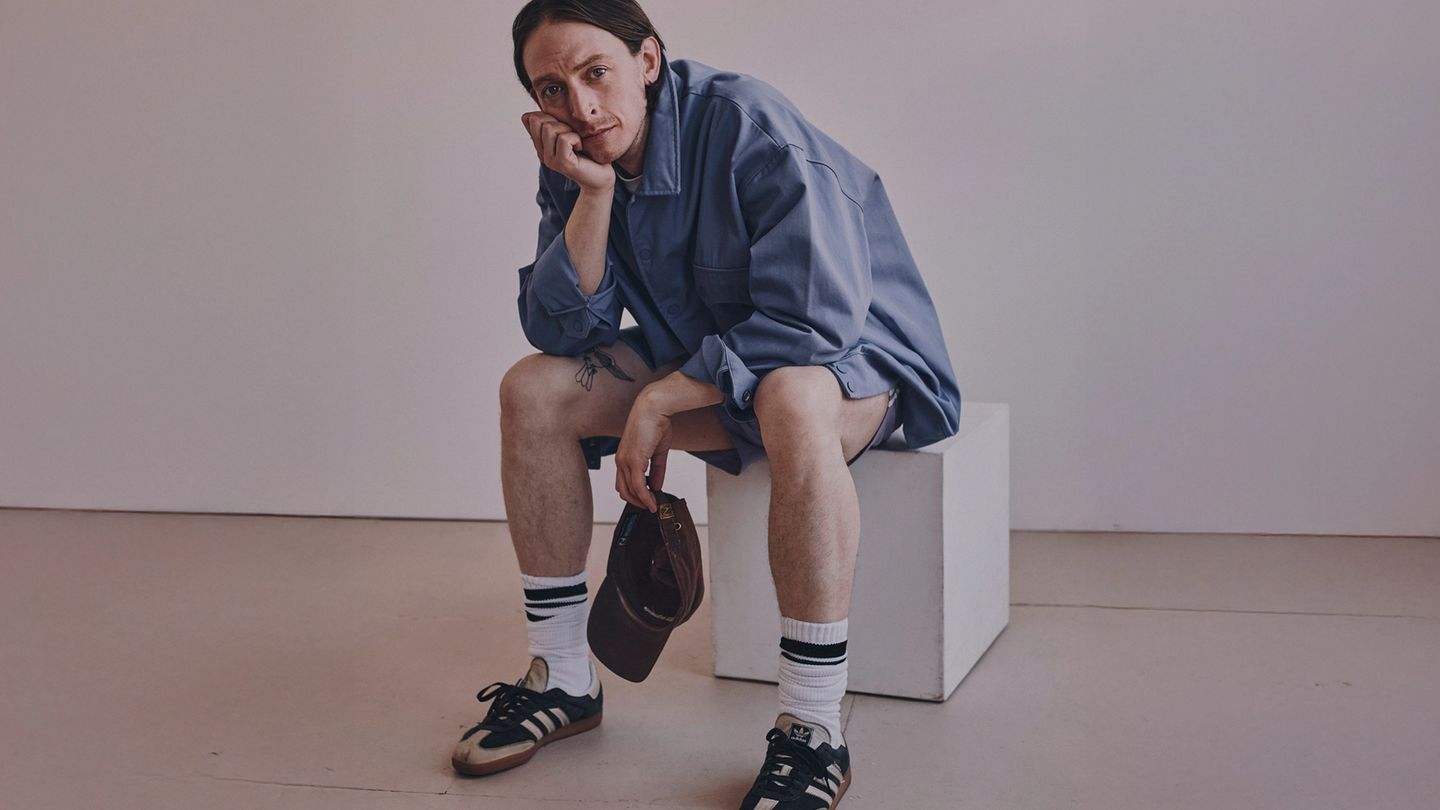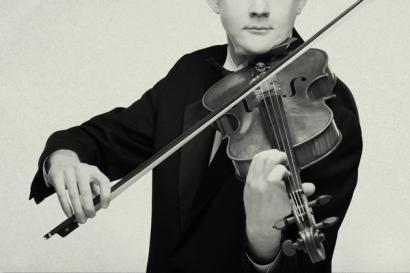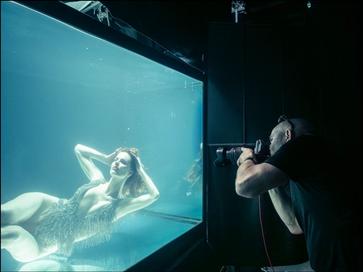

The hottest theatre production of the year, Stereophonic landed at the Duke of York’s Theatre to exceptionally rave reviews. The Guardian cited it as “an extraordinary, electrifying odyssey”, while the Financial Times called it a “sublime five star hit.” Having opened in June following its time in New York City, its run has now extended to November 22, 2025. It’s been no surprise, really, considering the play, which was written by David Adjmi, directed by Daniel Aukin and features music written by Arcade Fire frontman Will Butler, is the most Tony Award-nominated film of all time (it received a record-breaking 13 nominations last year after the curtain went up on Broadway).
Focused on a burgeoning (and then successful) fictional band in the 1970s, it’s a three hour plus long play, based entirely in a recording studio, centred around a vintage 70s mixing desk, that keeps you gripped in the throes of the making and eventual breaking of a rock band in 1976.
Zachary Hart, a Birmingham-born actor who earlier this year made a name for himself after a role in The Seagull at the Barbican alongside Cate Blanchett and Tom Burke, takes on the part of one quarter of the band as Reg the bassist. His character, who performs alongside Lucy Karczewski, Jack Riddiford and Nia Towle in the band, is the most intriguing to watch.
Married to band member Holly (Towle), his story is a turbulent one of alcohol and drug-induced trauma, heartbreak and eventual, ambivalent self-reflection. You can’t help but find sympathy for him, among a cast of characters that are otherwise quite unlikeable. And that is, of course, down to Hart’s acting. Born in the Black Country, he puts his spin on a Cockney accent (he and fellow band member Simon met at art school in London), and the loveable Reg comes to life.
Gentleman's Journal sat down with Hart to discuss the play, how he found himself ditching a mundane Black Country job and finding his place on the boards, and what he thinks of Reg and co.
Zachary, how did the role come about?
It came from an agent email to begin with, but immediately when I saw the name Stereophonic, I knew Stereophonic from flying around online with the Tonys chat, and I knew that it was the most successful play that’s ever been. I was sent the script, and I knew I was going to be playing Reg, and I was completely hooked by the challenge of what it would be to try and bring that character to life. He does a little bit of everything and reaches some seriously dark places.
Were you happy that you were offered the opportunity to play Reg?
He’s got a childlike naivety to him, unlike the others who seem to have a streak that’s not very kind. His streak doesn’t have any nastiness, and it’s more about the illness. I would’ve forgiven myself if I’d have turned around and said ‘no I’m not going to do this.’ It scared the life out of me when I read the script, as those parts are sort of limitless. In my mind, some parts fall into limitless territory, and he feels kind of limitless. So those parts I think scare and I felt like, if I can’t do this, I’ll stop and do something else away from acting.
Is that how you approach roles?
Definitely. I think if I'm going to have to really build a bridge to a character, rather than know that a character's within my grasp, that's what intrigues me most. I’ve had roles I’ve turned down for that reason. Because I have a Brummy accent, I got into a pattern of playing the character who’s a sandwich short of a picnic, and I now tend to say no to things that are leading down that path.
What was difficult about the production?
We didn’t attack rehearsals as usual with script-first, which was Daniel Aukin’s idea. We were on our feet from day one, which was very different. I found that really, really, really hard to begin with, because I worship at the altar of script. I think that I blossom when I sort of know what my character wants and then I springboard onto stage with that locked inside me, and then night to night I potentially change my tactics in order to try and achieve that. To keep it fresh, to keep it alive. At the moment, I'm working out how to bring that sort of heart - my heart - to this part, but also honour the play in the Daniel Aukin style.
You haven’t been acting for that long - what was life like before you went on stage?
I am the sort to pinch myself on a daily basis with doing what I'm doing now compared to what I was doing when I was living in the Black Country, yeah. But also, why I was so unhappy in the Black Country is I was doing a job that was the same everyday. It was mundane, there was clock watching, and there was a torturous element. Nothing against my people or my family, but I knew I had an explosive energy in me and I was in the wrong place from a young age. I worked in a factory at the time of getting the Reg role, so it really was a 360. Then next thing I’m walking through the centre of London with a jock strap and a leotard on and I was giggling to myself with a coffee in hand.
How did you get to where you are today?
Completely by luck. An ex partner of mine put in an application for me for drama school, and it was the only school taking applicants as it was so late for the year. I got in, and the Friday I ended my job, and by Monday I was in a leotard at drama school.
How did you approach Reg? What did you need to do to build that character?
I didn't see the play in New York and I'm really thankful I didn't because all I heard was how good Will Brill was. I really dive into the script, and pull as much as I can from the script in order to invent this person. Then I go back to what he wants in that moment, that week, and in his life. It feels like pulling the bow back, sticking your arrow in, loading it up and letting it go. I float back from a bottle of Jack Daniels down, to a bit drunk but a bag of cocaine down. It’s a back and forth with Reg. I wanted to portray the feeling like you're doing really crap physically and I was physically getting into his body. I looked at a lot of 70s stuff.
When it comes to the music in Stereophonic, is it live?
Yeah, completely live and all like 70s instruments. See you. The mixing desk is the actual mixing desk from the 70s in California that recorded Midnight Train to Jordan. So when they record music in the play and play it back, that’s literally just been recorded.
How involved was Will Butler?
He was very involved. He didn't necessarily need to be, but the whole ethos of the show is, like we did a whole week of band. 50 hour weeks of band before we touched the script. Will was there for everything. He was involved a lot, which was an absolute dream for me, because I think the man's a genius. My dad and I are massive Arcade Fire fans and now he’s got my dad’s number and my dad’s telling all his mates in the Black Country.
There is no finite ending - what do you hope is the ending for Reg? I thought he was going to die in the production.
I obviously hope that Reg finds peace, but to be honest, and I had a big discussion with the writer and director about this, I feel that it's destined that in a year after the play finishes, that Reg overdoses accidentally and he's gone. I think there's a forever unhappiness in him. I think people take it different ways, but to me, he’s kind of back on it in the end. I think Reg is one of those people that is incurable. I wanted him to vibrate with unpredictability and heartache. So many of these guys back then, without the right medication and help, were incurable.
Were you familiar with the era and genre of music?
I knew Led Zeppelin because of Robert Plant being from the black country, but I wasn’t always aware of that 70s rock and roll really. It kind of missed me. I was completely brought up on Motown. As rocky as we got with David Bowie.
What’s your favourite moment in the play?
I think my favourite is when we're all together writing a version of Bright. When Peter gets everyone to come back into the room and he slows it down and it's wrong and we all stop. And then he gets on piano and just sort of plays it raw, and then we all start adding to it. There's a huge silence at the end. I think it's pretty powerful. One in every five audiences claps. That moment is pretty special.
And then, it’s exhausting, but in the first act I’m off it on drugs, and then I’m off it on alcohol, and then I’m emotional and have a sort of Stella in A Streetcar Named Desire moment. It’s very varied, and as an actor it’s pretty wild to get to do that.
What do you want people to take away from the play?
From having conversations with people at the stage door, even the people who hate it, are really taking things from it. One guy was like 'God, I was watching Peter the whole time and I was thinking, 'I hope I'm not like that with my wife.' I think the play is holding a mirror up to certain types of people. You know what I mean?
And then, what I desperately hope is that anybody who's creative and never really had a crack at it, is inspired. Because I was one of those people for many, many, many years that was riddled with creativity and had no way to get it out of me. And it really had an effect on me. So I do hope that if anyone else is in that situation, they can find an unlock in this.
Photography by Pip Bourdillon
Now read an interview with F1 actor Will Merrick
Become a Gentleman’s Journal member. Find out more here.


